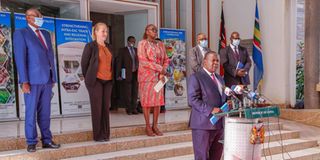Relief for businesses as Kenya, Britain reach post-Brexit deal

CSs Fred Matiangi and Betty Maina after successful negotiations with the UK on a post-Brexit bilateral trade agreement authorised by President Uhuru Kenyatta and British PM Boris Johnson.
Kenya and the UK on Tuesday reached decisive consensus on a new trade agreement, nearly 55 days before expiry of existing privileges as London formally exits the European Union protocols.
The new agreement, which includes clauses from the old Economic Partnership Agreement under the European Union, will now be made formal upon signing of agreed texts between the two sides.
"The agreement will provide continuity for businesses, investors and supply chains besides setting foundations for further economic development," Trade Cabinet Secretary Betty Maina said yesterday.
The latest development came after a marathon session of virtual talks between officials in Nairobi and London to iron out contentious issues.
Ms Maina and her Interior counterpart Fred Matiang'i led the Kenyan side in talks with UK Minister for Africa James Duddridge, International Trade Minister Ranil Jayawardena and the Prime Minister’s Trade Envoy to Kenya Theo Clarke.
The officials initialed on the draft documents, which indicates that negotiations on the agreement have been completed and will await formal signing ceremony.
A dispatch issued on Tuesday evening said the two sides had reached common ground on major trade issues for an agreement that will take over from 2021, after the UK exits the transitional clauses of the EU.
The UK quit the EU following a referendum in 2016 but has been undergoing transition, among other things, to replace agreements it had signed under the EU bloc.
Signed deals
In Africa, it had already signed five deals, mainly through economic blocs. In East Africa, Kenya chose to negotiate bilaterally, initially, because it could be most harmed when transitional clauses expire.
Other countries in the region had wanted negotiations to start next year as they were in electioneering mode.
The pact is especially crucial to Kenya as its exports risk facing high tariffs in the UK as the existing EPA between the EAC members with the EU will cease to work for Kenya as it is not listed among Least Developed Countries (LDCs) like her regional peers.
Uganda, Tanzania, Rwanda and Burundi will continue to enjoy duty free access to the UK and EU due to their designation as Least Developed Countries which will give their exports over Kenya’s an advantage in the market owing to lower prices.
A dispatch from the British High Commission in Kenya said the deal will have entry clauses for other EAC member states.
Jane Marriott, the British High Commissioner to Kenya, said the deal will lay "the foundations to expand our trade in future."
“Whether it is in tea, horticulture, pharmaceuticals, or vehicles, trade between our countries continues to grow,” she said in a statement.
"It’s fantastic we’ve been able to complete negotiations so quickly and we look forward to working with the Government of Kenya to build on this in the years ahead.”
Billion-shilling business ties
Kenya and UK have business ties worth about Sh200 billion and Kenya often exported fresh produce under duty free and quota free arrangements with London.
The agreement was needed to continue those privileges from January.
“I’m delighted we've reached a trade agreement with Kenya. This deal gives businesses the certainty that they’ll be able to continue trading as they do now, supporting jobs and livelihoods in both our countries,” Marriott said.
Dr Matiang’i said it is crucial to have the deal signed by December 31 to ensure Kenya’s exports continue being competitive in the UK market, which is a top destination for Kenya’s agricultural exports such as tea, coffee and flowers.
The agreement follows a meeting between President Kenyatta and UK Prime Minister Boris Johnson’s in January where they agreed a five-year strategic partnership deal on trade.






